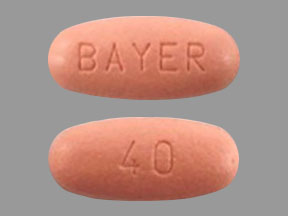Regorafenib and Alcohol/Food Interactions
There is 1 alcohol/food/lifestyle interaction with regorafenib.
Regorafenib Food/Lifestyle
Moderate Food Interaction
ADJUST DOSING INTERVAL: Depending on the amount of fat, food may enhance the oral bioavailability of both regorafenib and its active metabolites, M-2 and M-5. In 24 healthy male subjects, administration of regorafenib with a high-fat meal (945 calories; 54.6 g fat) increased the mean systemic exposure (AUC) of regorafenib by 48% but decreased the mean AUC of M-2 and M-5 by 20% and 51%, respectively, compared to administration under the fasted state. In contrast, administration with a low-fat meal (319 calories; 8.2 g fat) increased the mean AUC of regorafenib, M-2 and M-5 by 36%, 40% and 23%, respectively, compared to administration during fasting.
GENERALLY AVOID: Coadministration with grapefruit juice may alter the pharmacokinetics of regorafenib and its active metabolites. The proposed mechanism is inhibition of CYP450 3A4-mediated first-pass metabolism in the gut wall by certain compounds present in grapefruit. The interaction has not been studied specifically with grapefruit juice, but has been reported with the potent CYP450 3A4 inhibitor, ketoconazole. In 18 healthy male study subjects, administration of a single 160 mg dose of regorafenib on day 5 of treatment with ketoconazole (400 mg daily for 18 days) resulted in a 33% increase in mean regorafenib systemic exposure (AUC) compared to administration of regorafenib alone. Additionally, there was a 93% decrease each in the mean AUC of the M-2 and M-5 metabolites. Both have been shown to have similar in vitro pharmacological activity and steady-state concentrations as regorafenib, thus the net clinical effect of these pharmacokinetic changes is unknown.
MANAGEMENT: To ensure optimal oral absorption, regorafenib should be administered with a low-fat breakfast that contains less than 30% fat. Examples of a low-fat breakfast include: 2 slices of white toast with 1 tablespoon of low-fat margarine and 1 tablespoon of jelly, plus 8 ounces of skim milk (319 calories; 8.2 g fat); or 1 cup of cereal, 8 ounces of skim milk, 1 slice of toast with jam, apple juice, and 1 cup of coffee or tea (520 calories; 2 g fat). Patients should be advised to avoid consuming grapefruit or grapefruit juice during treatment with regorafenib.
References (1)
- (2012) "Product Information. Stivarga (regorafenib)." Bayer Pharmaceutical Inc
Switch to consumer interaction data
Regorafenib drug interactions
There are 262 drug interactions with regorafenib.
Regorafenib disease interactions
There is 1 disease interaction with regorafenib which include:
More about regorafenib
- regorafenib consumer information
- Check interactions
- Compare alternatives
- Reviews (14)
- Side effects
- Dosage information
- During pregnancy
- Drug class: multikinase inhibitors
- Breastfeeding
- En español
Related treatment guides
Drug Interaction Classification
| Highly clinically significant. Avoid combinations; the risk of the interaction outweighs the benefit. | |
| Moderately clinically significant. Usually avoid combinations; use it only under special circumstances. | |
| Minimally clinically significant. Minimize risk; assess risk and consider an alternative drug, take steps to circumvent the interaction risk and/or institute a monitoring plan. | |
| No interaction information available. |
See also:
Further information
Always consult your healthcare provider to ensure the information displayed on this page applies to your personal circumstances.


